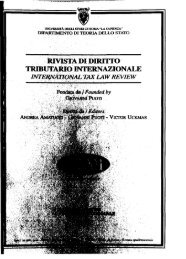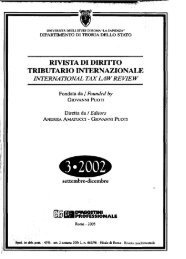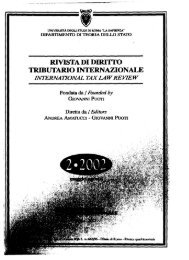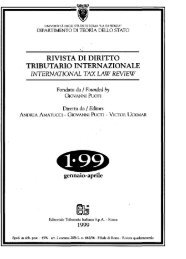RIVISTA DI DIRITTO TRIBUTARIO INTERNAZIONALE - Rdti.it
RIVISTA DI DIRITTO TRIBUTARIO INTERNAZIONALE - Rdti.it
RIVISTA DI DIRITTO TRIBUTARIO INTERNAZIONALE - Rdti.it
You also want an ePaper? Increase the reach of your titles
YUMPU automatically turns print PDFs into web optimized ePapers that Google loves.
A. S. Bergantino: Tonnage tax: the Italian proposal and the European experiences<br />
p. 20) -, and again to the 2001 Wh<strong>it</strong>e Paper where, the importance of such<br />
a measure is stressed and a Commun<strong>it</strong>y directive proposal on the subject<br />
is announced for 2002 (EU Commission, 2001).<br />
The Italian govemment is fully aware of the twofold need to observe<br />
Commun<strong>it</strong>y obligations and to conforrn lo lhe experiences of olher European<br />
countries: the Bill, in fact, establishes that the final set up of the<br />
new tax regime should take into account the 1997 guidelines and should<br />
be based on analogous regimes already set up in other member states.<br />
2. The European Commun<strong>it</strong>y stand on tonnage tax<br />
Since 1989, the European Commission having acknowledged the importance<br />
of the social and economic role of Commun<strong>it</strong>y fleets (2) and<br />
their current lack of compet<strong>it</strong>iveness on the global markel, has set out<br />
specific 'mles of compatibil<strong>it</strong>y' w<strong>it</strong>h the common market mles of measures<br />
aiming to boost the shipping sector (EU Commission, 1989).<br />
The 1989 document outlined the cr<strong>it</strong>eria to identify as "admissible",<br />
though still qualifying as state aid, fiscal alleviation measures for the sectoro<br />
The Commission, however, fixed a ceiling wilh respecl lO such subsidies<br />
based on the difference of cost between member countries on one<br />
si de and third countries on lhe other (3).<br />
Eight years later, on 5 July 1997, the European Commission, in the<br />
light of the continuing decline of the member states' fleets, still penalised<br />
in terrns of compet<strong>it</strong>iveness w<strong>it</strong>h respect to those sailing under a third<br />
country's colours, passed a new document (EU Commission, 1997) - that<br />
which is referred to in the Bill - which provides that the aid be strictly<br />
linked lo specific operations, rather than being tied to hypolhetical cost<br />
differentials.<br />
The main guidelines contained in the 1997 document are aimed at:<br />
neutralising the compet<strong>it</strong>ive advantages of shipping companies operating<br />
w<strong>it</strong>h lower standards;<br />
guaranteeing thal transport services w<strong>it</strong>hin the Commun<strong>it</strong>y be carried<br />
out in a free and compet<strong>it</strong>ive market, maintaining high safety and<br />
qual<strong>it</strong>y standards;<br />
(2) Intended as tonnage enrolled in the national registries of member countries.<br />
(3)This ceiling \Vas calculated as the difference bet\\,reen the operating cost of an<br />
hypothetical ship registered in the register of a "lo\\' wage cost" European country and<br />
the same ship sailing under a "flag of convenience' (Portugal and Cyprus, respectively).<br />
<strong>RIVISTA</strong> <strong>DI</strong> <strong>DI</strong>RITTO <strong>TRIBUTARIO</strong> INTER\AZIONALE 312001






